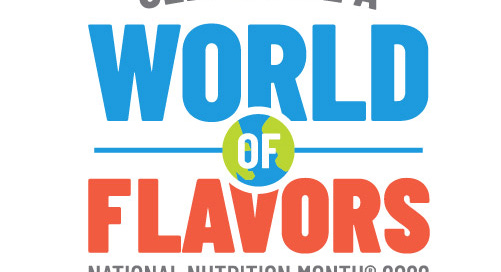In March in the United States it is National Nutrition Month. This was created by the Academy of Nutrition and Dietetics (AND) to encourage people to learn about healthy eating choices and physical activity.
This year the theme is “Celebrate a World of Flavors”. Which for me, as a food scientist, is reaching for my spice cabinet rather than my fruit, vegetables, and whole grains. I do like that this idea suggests that other food cultures, not just the Mediterranean diet, are healthy. To me there is nothing wrong with a good Indian meal full of spices and flavor or Mexican rice and beans with a side of guacamole or sour cream.
The idea behind Nutrition Month is laudable. The intent is to educate people about food and health, which is never a bad thing in my opinion. However, I have a strong reluctance to write about nutrition. I struggle with the fact that everybody has an opinion of what is healthy food. Additionally, I don’t want to teach about nutrients; about vitamins, nutrient dense foods, phytochemicals etc.
I studied nutrition for my undergraduate degree. Strongly influenced, I believe, by a mum who ate wholewheat bread, when wonder loaf was available, and avocados when no one else seemed to know what it was. My dad ate Energin rolls which were an early low carb “bread” as part of late 1960 a low carb diet to lose weight. He lost weight and claims he got gall bladder issues because of the high fat in the diet.
After my degree I came to the conclusion that we really don’t know what food does and eating a little bit of what you like is probably the best way to go. Additionally, being knowledgeable about those nutrients; about vitamins, nutrient dense foods, phytochemicals etc. helps us make informed food choices.
Nutrition is often presented as a monolith; one size fits all. Even nutritional facts on food packages encourage this thinking. This is clearly ridiculous! My five foot, slightly overweight, mostly sedentary body does not need the same food as a 6-ft peak of fitness athlete. Fortunately, I don’t need to eat to maximize my performance. Hmm, as I write this, I realize that perhaps I need to rethink that attitude.
BMI is used to diagnose if someone is overweight or obese, when the science really shows that BMI works at a population level NOT an individual level. BMI ignores health issues, fitness levels, age influences, muscle mass, and trauma.
I am not going to tell you what food is good or bad for you. I don’t agree with the idea that food has a moral value. It just is. There is nothing wrong with eating energy dense foods on occasion or eating nutrient dense foods rarely. Unfortunately, we are presented with lots of information that moralizes on food choices and the apparent results of those food choices. We see adverts for fast food and in many poorer regions of the US, the only food available is fast food or prepackaged meals. This is coupled with the fact that, despite living in one of the wealthiest countries in the world, many of us are one paycheck away from not knowing where our next meal will come from.
On a global level, the Sustainability Development Goals, especially SDG 2, have the goal of reducing hunger by 2030. Unfortunately the pandemic made that goal harder to reach and millions more than predicted are currently hungry or food insecure. I hope it is possible to recover our earlier successes on reducing hunger especially for children.
In the next few weeks I will explore some of these issues about nutrition. I struggle to write about nutrition and so I will discuss that in next week’s article.
What are some of the questions you have about healthy food choices, nutrition, and wellness? Let me know in the comments and I will do my best to answer them in a future article.
---
I write about the intersection of food science and food systems with an emphasis on food safety, food justice and resilience. I am concerned that climate disasters and changing weather patterns are affecting our ability to eat healthy nutritious food.
I run a food safety consultancy, Food Safety Mid Atlantic, which I started in 2018 to support small and mid sized food businesses with food safety and product development. I support clients to develop a robust food safety program and to scale up their businesses while allowing them to maintain integrity with their values.
My primary goal is to support my clients so they make food at cost that is safe, tasty and compliant with federal, state, and local regulations.
If you are interested in learning more about my consulting services:
If you aren’t already subscribed to Food Crumbs, please subscribe to get full access to the newsletter and never miss an update.








I would love to know your thoughts about a very low carb or keto diet?
I am also a member of the AND and am looking forward to seeing what you post this month! :)